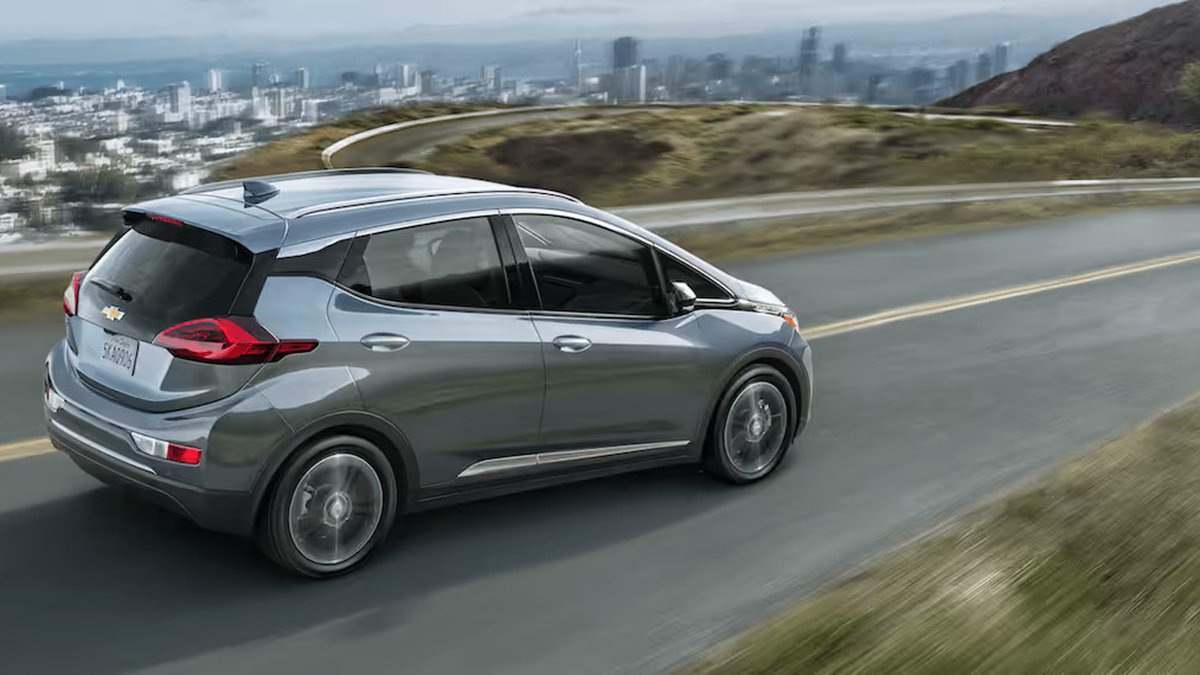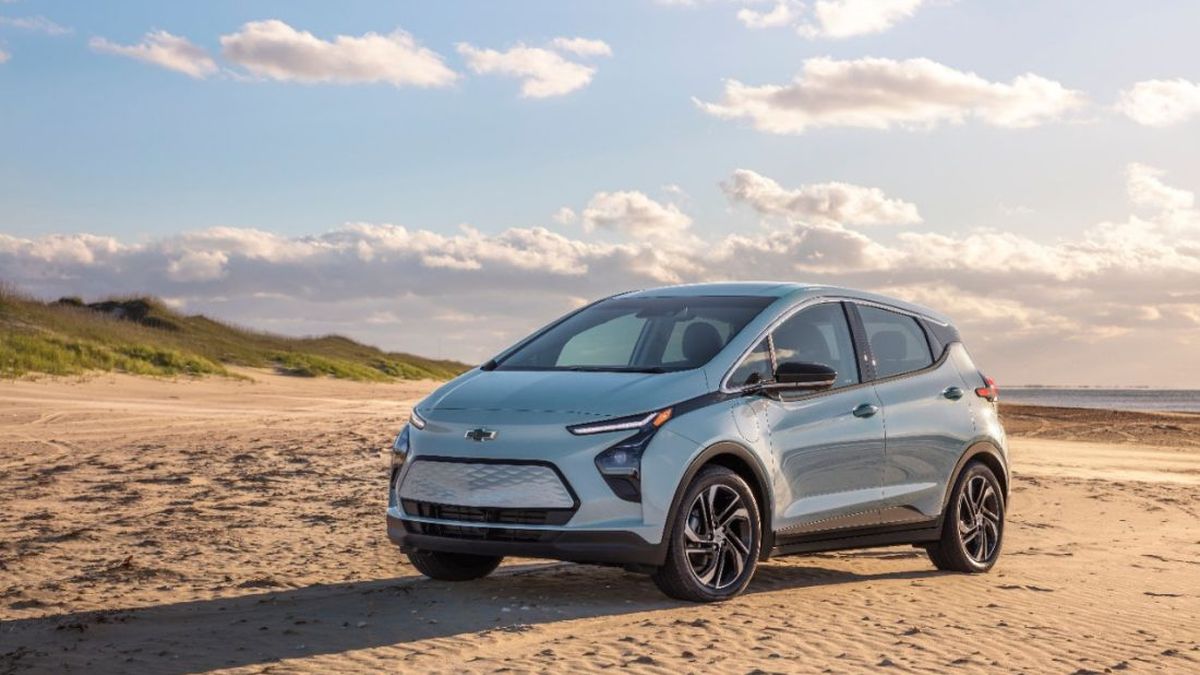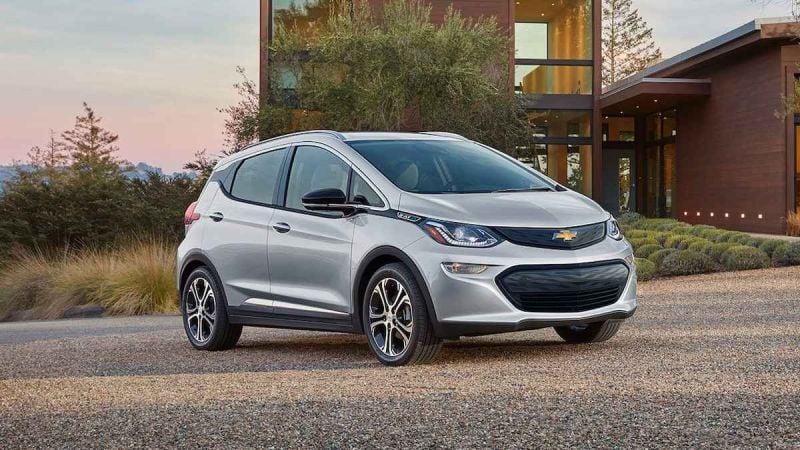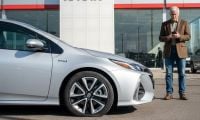Electric cars were hailed as the turning point, a clean break from gasoline, oil changes, and tailpipe emissions. They offered a glimpse of a quieter, simpler future where drivers could skip the pump and smile at their shrinking maintenance bills. One of the early promises of this shift, the Chevy Bolt, carved out its own place in that story, affordable, practical, and surprisingly fun to drive.

And while much of that has come true, a story out of Reddit’s r/BoltEV reminds us that progress, like electricity, sometimes shorts out in spectacular fashion.
Let’s begin with the quote:
“In case anyone was curious, how much insurance does a punctured battery cost to replace.
Advertising
They said just the battery was like 16k. Needless to say, it totaled my 2023 Bolt.”
That was Reddit user smOKlahoma710, whose three-month-old Chevy Bolt EUV met its demise not on a twisty canyon road or in a fiery highway pileup, but in a 4-inch-deep puddle. “I found out about it after we went through a puddle like 4-5 inches deep and the light came on and stayed on,” they explained. The result?
A dead battery, an $18,116 estimate from insurance, and a totaled car. It's the kind of anecdote that EV critics are usually accused of inventing, but this time, the numbers are real, the screenshots are posted, and the car is gone.
Key Insights on EV Battery Costs, Lifespan, and Warranties
- The average cost to replace an EV battery ranges from $5,000 to $20,000, depending on the vehicle's make, model, and battery size. For instance, replacing the battery in a Tesla Model 3 can cost around $15,800 when labor is included.
- EV batteries are designed to last for the expected lifetime of the vehicle. Studies have shown that the average EV battery degrades by just 1.8% per year, suggesting that many batteries can last 20 years or more.
- Most EV manufacturers offer battery warranties lasting at least 8 years or 100,000 miles. This means that if a battery fails within this period, the replacement cost is typically covered by the manufacturer.
- The cost of EV batteries has been decreasing over time due to advancements in technology and increased production. For example, the cost per kilowatt-hour has dropped from over $400 in 2012 to around $111 by the end of 2024, making future replacements more affordable.
Of course, this revelation sent ripples through the BoltEV subreddit, mostly sympathy, some disbelief, and a lot of commiseration.

One user, RedlyrsRevenge, said it plainly: “Ooof... That sucks big time.” Another, B1BLancer6225, tried to make sense of the price tag: “That’s insane. They are going for $3500–$4000 on the used market with 2k miles on them... Gaaa $18k+ for a battery is insane.” And yet, the insurer’s quote doesn’t exist in a vacuum. GM’s official parts list puts full replacement battery packs for Bolts somewhere around $15,000–$16,000, before labor. This isn’t fiction, it’s arithmetic.
And then there's the wait. “Five days” was what the repair estimate said, but as smOKlahoma710 clarified, “It has said 5 days since before they even had a quote. That’s just what it says. Ignore that.” Most owners know better. One user chimed in,
“I’m hearing closer to 3–4 months wait right now. So 5 days would be a godsend.”
Another added, “Just got my warranty battery replacement… nearly 4 months waiting.”
Why EV Owners Have Limited Maintenance Control
What’s most unsettling is how little control the average EV owner has over their own machine. Unlike ICE vehicles, where a competent DIYer can replace an alternator, a head gasket, or even rebuild a transmission with the right tools and gumption, =EVs are sealed boxes.
"Brake work, fluids, control arms, bushings, bearings, I have the ability to replace those,” wrote user HachiroFit. “But the HV battery? At the very least, I’d have to have a shop replace it for me. Then probably have to pay GM to do some software magic so the computer accepts the swap.”
Why Drivers Stick With Their EVs Despite High Costs
Still, what’s remarkable, maybe even admirable, is how many Bolt owners continue to love their cars.

Despite the horror story, smOKlahoma710 isn’t abandoning ship.
“I’m looking at a ‘22 Bolt EUV with 16k miles… it had its battery replaced about 200 miles ago, but it’s still in 80% jail.”
That’s right, after getting a new battery, the software still won’t allow full charging. Another user helpfully pointed out, “New batteries do not normally have the 80% restriction,” but try telling that to the car’s ECU.
Chevy Bolt EV Performance, Depreciation, and Recall Overview
- The Bolt EV boasts a 4.6 out of 5 overall satisfaction rating, with 87% of drivers indicating they would purchase another Bolt.
- The 2019 Bolt EV has depreciated approximately 53% over three years, placing it in the 75-100% percentile for depreciation among 2019 hatchbacks.
- A significant recall due to battery fire risks affected all Bolt models from 2017 to 2022, leading to battery replacements and contributing to depreciation concerns.
- GM discontinued the Bolt EV in December 2023 but announced plans for a next-generation Bolt EUV, expected to debut in 2025 for the 2026 model year.
This loyalty, even in the face of absurd repair costs and manufacturer-induced digital handcuffs, speaks volumes. One commenter said it best: “We love our Bolt though.” Another found solace in incentives:
“I just found an amazing deal on some Equinox EVs. $19k after the EV tax credit and Bolt owners rebate.”
The system may be flawed, but the ride is smooth, the torque is instant, and the rebate checks are real.
So what do we take away from all this? That EVs are junk? Not quite. EVs are perfect? Definitely not. What this saga showcases is the fragility baked into the modern electric vehicle, a technology still in its adolescence.
When one part of the system fails, and that part costs more than half the car’s value to replace, you're not driving a vehicle anymore; you're driving a liability. This isn't a teardown of the EV revolution. But it is a reality check. Because in a world where a puddle can total your car, it's worth asking: are we really ready for the future we’ve been sold?
Have you ever had to get your battery replaced in your EV? How much did it cost, and would you pay that much again?
Let us know in the comments below.
Image Sources: Chevy Newsroom
Noah Washington is an automotive journalist based in Atlanta, Georgia. He enjoys covering the latest news in the automotive industry and conducting reviews on the latest cars. He has been in the automotive industry since 15 years old and has been featured in prominent automotive news sites. You can reach him on X and LinkedIn for tips and to follow his automotive coverage.














Comments
Typical FUD (fear,…
Permalink
Typical FUD (fear, uncertainty, and doubt) article. The ONE purpose of these stories is to make people who own a gas vehicle choose to NOT buy an EV. BEVs have lower maintenance and operating costs. So how do you get the general public to ignore that fact? Come out with half-true stories about vehicle fires, or super high repair costs that do not represent what most EV owners know to be true. But these stories get clicks, so they get reposted regardless of being anti-EV propaganda.
I am not arguing with your…
Permalink
In reply to Typical FUD (fear,… by DeanMcManis (not verified)
I am not arguing with your point about articles about EVs written to increase fear/ unknowns.
I think it is about clickbait.
My gripe with the article is " a competent DIYer with the right tools" can rebuild a transmission."
I'm old school, have pulled engines, rebuilt and reinstalled short blocks, rebuilt front ends, etc. Not a tranny guy.
Just had a tranny in my 2015 Explorer dropped out and rebuilt by a dealer. It is several hours of labor just to get the mother out.
There are horror stories for every make and model. It just seems like the auto industry is just going in the wrong direction- chasing mpg/electronics/options to the detriment of long term dependability/life cycle cost.
YMMV.
Totally respect that…
Permalink
In reply to I am not arguing with your… by JP ONeill (not verified)
Totally respect that perspective, every type of vehicle has its own set of challenges. I included the DIY bit to show it’s possible, but definitely not easy or for everyone. Appreciate your thoughtful take and for sharing your experience!
Totally hear, this story was…
Permalink
In reply to Typical FUD (fear,… by DeanMcManis (not verified)
Totally hear, this story was just about sharing my real experience, not knocking EVs overall. Hopefully it helps raise awareness so others can avoid the same costly mistake. Thanks for your thoughts!
The ground clearance is more…
Permalink
The ground clearance is more that 5 inches, I call bs on 4-5 inches. This is the same type of guy that says he drove through a 4 inch puddle and hydrolocked his engine.
I probably would too if I…
Permalink
In reply to The ground clearance is more… by Travis (not verified)
I probably would too if I hadn’t lived it! I was shocked by the outcome myself.
I call B.S. on this as well…
Permalink
In reply to The ground clearance is more… by Travis (not verified)
I call B.S. on this as well. I have 2018 and 2022 and live in El Paso. I have driven in flash flood puddles that the water came inside the car. Don't recommend doing this but I have done 5 inches of water no problem with both vehicles. Oh by the way my maintenance on my 2018 to date with 269,000 miles is about $2700. I'm not including tires because I do gig work for a living, but this little jet of a car is by far one of the best vehicles I have ever owned. Next to my 1988 Nissan Senta which I put 700,000 plus miles on it.
I'm calling BS in a 4inch…
Permalink
In reply to The ground clearance is more… by Travis (not verified)
I'm calling BS in a 4inch puddle as well. I own one and have been through deeper puddles. I think the driver of that car was lying about how deep that puddle was. Or they already had an issue and the splashing ruined it more.
We've run our two '19 Bolts…
Permalink
We've run our two '19 Bolts through all kinds of weather, including some pretty deep road washouts, without a problem. Both 32-33k miles, only maintenance bigger batteries and tire rotations until new ones on before winter. Still have the original 12V batteries!
Sounds like you’ve had a…
Permalink
In reply to We've run our two '19 Bolts… by Duke Woolworth (not verified)
Sounds like you’ve had a great experience with your Bolts! Shows how tough and reliable they can be when cared for. Thanks for sharing your story!
We got caught in some pretty…
Permalink
In reply to We've run our two '19 Bolts… by Duke Woolworth (not verified)
We got caught in some pretty bad rain and flooded roads yesterday in our 23 1lt with 38k miles. Knock on wood still runs drives and charges like a dream.
This reminds me of kids that I knew in elementary school that thought electric cars wouldn’t be able to drive in rain 🤣
A 4 inch puddle shouldn’t…
Permalink
A 4 inch puddle shouldn’t even get the battery wet, and regardless they’re made to get wet. What part of this story are we missing?
The part where he hit…
Permalink
In reply to A 4 inch puddle shouldn’t… by Jim (not verified)
The part where he hit something in the puddle and punctured the battery pack lol
Exactly! that’s what makes…
Permalink
In reply to A 4 inch puddle shouldn’t… by Jim (not verified)
Exactly! that’s what makes this so surprising. I’m still trying to piece it all together myself.
This article is badly…
Permalink
This article is badly written. The author repeatedly says "a puddle" destroyed the Bolt battery, as if a little ground water shorted the electrical system.
But the author (inadvertantly?) included a quote from the owner verifying that the battery was <em>punctured</em>. It struck the ground hard enough to rip through a steel plate!
That's like claiming a gas car is "fragile" because hitting a "pebble" can puncture the oil pan and burn up the engine. Absurd.
Please stop with the lies. I…
Permalink
Please stop with the lies. I've driven my 2021 Bolt through standing water deeper than 4" on several occasions and have no problems. The issue here is the driver, not the car. Please tell the world how recklessly you were driving at the time so as to clarify the point. Thanks.
Statistics are kind of…
Permalink
Statistics are kind of important. What percent of all EVs are needing new batteries after driving through puddles?
Take it to a secondary…
Permalink
In reply to Statistics are kind of… by Statistics (not verified)
Take it to a secondary market battery replacement company, have them install a rebuilt battery or one from a totaled out volt and the cost will be reasonable. Of contact me and I will buy it out of salvage from you. My 2018 Toyota was totaled by a post someone impaled between the bed and the cab. $14500 auction purchase, $1700 body work. I have a $30000 and no one knows the difference.
I cannot believe this…
Permalink
I cannot believe this article because it lacks verifiable details. Who is the owner? Which dealer in which city? Which insurance company on what date? Why is the dealer not covering the cost? What is the VIN?
All verifiable information was omitted. I must conclude it is an AI assisted lie.
“In case anyone was curious,…
Permalink
“In case anyone was curious, how much insurance does a punctured battery cost to replace.”
OK, so the plate covering the battery was punctured (how? its steel isn’t it?) AND then it was run into water. I’ve had an ICE vehicle have its gas tank punctured … if we had been unlucky it could have resulted in a fire, and wiped out our house … or burnt us alive. Does this happen frequently? No. Can it be really expensive? Yes.
Depending on the circumstances this *might* be some sort of manufacturing flaw. The story, as written, leaves a LOT to the imagination!
I have seen plenty of…
Permalink
I have seen plenty of gasoline engines destroyed by driving through water. Gas, diesel and EVs can be destroyed by water. Perhaps the answer is to avoid driving through a flood.
Congratulate the editor…
Permalink
Congratulate the editor responsible for this headline. They've just punched Torquenews' reputation in the kidneys. Way to clickbait!
I agree that this is anti EV…
Permalink
I agree that this is anti EV propaganda.
Note: replacement batteries are available from junkyards for $2500.
Drove my 2020 Chevy Bolt…
Permalink
Drove my 2020 Chevy Bolt through a flooded road a few years ago - no problem.
You make a big deal of the…
Permalink
It wasn't just a puddle, as though water did the car in. Clickbait..But from the owners' reference to a 'punctured battery', it is clear that he drove it where he shouldn't have and hit something solid while moving. Sad, but not the EVs fault. And possibly the reason his insurance wouldn't cover it.